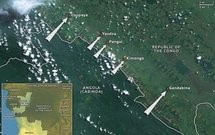 Angolan troops stationed in Cabinda, an Angolan exclave that is separated from the rest of country by a strip of territory belonging to Congo, crossed the border into Congo on Oct. 13. A rebel group called the Front for the Liberation of the Enclave of Cabinda has been sporadically active in the region since 1963, fighting for Cabinda's independence.
Angolan troops stationed in Cabinda, an Angolan exclave that is separated from the rest of country by a strip of territory belonging to Congo, crossed the border into Congo on Oct. 13. A rebel group called the Front for the Liberation of the Enclave of Cabinda has been sporadically active in the region since 1963, fighting for Cabinda's independence.
Because of this rebel activity, Angola has around 4,000 troops deployed in Cabinda. Some 500 of these troops, a mechanized infantry battalion, participated in the incursion, taking up positions in the towns of Kimongo, Pangui, Iloupaya, Yandza and Gandabina -- all roughly 5 kilometers (3 miles) across the border -- as they pursued the Cabinda rebels. The rebels frequently use the border to escape the Angolan military, and although Brazzaville does not support the rebels, the inability of its security forces to impede their movement in Congolese territory enables the rebels to continue to elude Angolan security operations.
However, once Angolan forces had taken up positions in Congo, they did not continue to pursue the rebels. Instead, they captured some 46 Congolese soldiers who were sent to the border in response to the incursion. The countries have traditionally had positive and constructive relations, and while the capture of Congolese soldiers could be seen as an act of aggression, Angolan forces have refrained from violence.
Angola will seek assurances from Congo that it will step up efforts to interdict Cabinda rebels seeking refuge in its territory. However, there is little that Congo can do to stop rebel activity -- the area in question is remote, the border is porous and the Congolese military is hardly capable of monitoring and controlling the length of the border. Despite Congo's best efforts, it is likely that the rebels will continue to take advantage of the border.
The Angolan military's incursion into the Republic of the Congo in response to rebel activity on the border is more about a tough negotiating position than it is direct aggression between the countries. Angolan troops stationed in Cabinda, an Angolan exclave that is separated from the rest of country by a strip of territory belonging to Congo, crossed the border into Congo on Oct. 13. A rebel group called the Front for the Liberation of the Enclave of Cabinda has been sporadically active in the region since 1963, fighting for Cabinda's independence.
Because of this rebel activity, Angola has around 4,000 troops deployed in Cabinda. Some 500 of these troops, a mechanized infantry battalion, participated in the incursion, taking up positions in the towns of Kimongo, Pangui, Iloupaya, Yandza and Gandabina -- all roughly 5 kilometers (3 miles) across the border -- as they pursued the Cabinda rebels. The rebels frequently use the border to escape the Angolan military, and although Brazzaville does not support the rebels, the inability of its security forces to impede their movement in Congolese territory enables the rebels to continue to elude Angolan security operations.
However, once Angolan forces had taken up positions in Congo, they did not continue to pursue the rebels. Instead, they captured some 46 Congolese soldiers who were sent to the border in response to the incursion. The countries have traditionally had positive and constructive relations, and while the capture of Congolese soldiers could be seen as an act of aggression, Angolan forces have refrained from violence. Their continued presence in the Congo has prompted diplomatic contact.
While Congolese President Denis Sassou-Nguesso returned from a meeting with other regional leaders, local ambassadors engaged in private negotiations. Neither government has commented publicly, illustrating their focus on talks. In addition, the Angolan forces reportedly have stayed in place and have not conducted further operations in the Congo, suggesting that the incursion was intended to get diplomatic results, not to achieve a military objective within the Congo.
Angola will seek assurances from the Congo that it will step up efforts to interdict Cabinda rebels seeking refuge in its territory. However, there is little that Congo can do to stop rebel activity -- the area in question is remote, the border is porous and the Congolese military is hardly capable of monitoring and controlling the length of the border. Despite Congo's best efforts, it is likely that the rebels will continue to take advantage of the border.
Courtesy : Stratfor (www.stratfor.com)